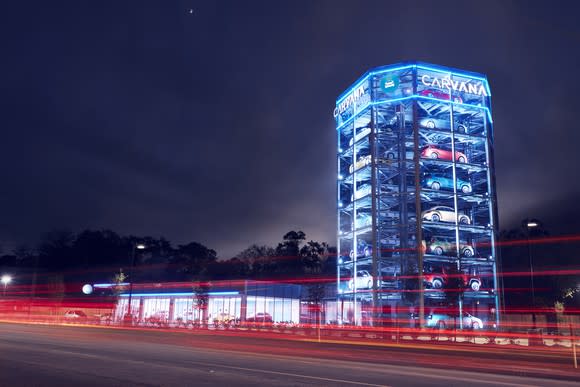Should This Move Scare Off Early Carvana Investors?
What do you get when you cross a megamultinational e-commerce company, Alibaba Group (NYSE: BABA), which seems to have a presence everywhere, and Detroit's second-largest automaker, Ford Motor Company (NYSE: F)? One of the answers is a serious potential threat to Carvana Co.'s (NYSE: CVNA) long-term growth story.
Let's dig in to the recent development with Alibaba and Ford, and see why Carvana investors should keep an eye on their recent project.
What's going on?
Carvana hit the scenes as a growth stock, as the company hoped to transform how quickly and painlessly investors could purchase a used vehicle. It recently launched delivery services in Denver, enabling consumers in the area to shop from more than 10,000 company-owned vehicles on Carvana.com -- then finance, purchase, and schedule potential next-day delivery in as little as 10 minutes. It's even possible to trade in a current car.
Used vehicles (both e-commerce and delivery) remain the bulk of its business; the company has expanded from 21 total operating markets at the end of 2016 to 44 at the end of 2017. But what grabs younger consumers' attention, and has been a valuable branding tool, is Carvana's unique vending-machine concept. Seven of these car vending machines were in operation at the end of 2017.

Image source: Carvana Co.
The vending-machine concept has been a hit with millennials who prefer unique and "shareable" experiences. It goes beyond experiences, too, as management notes a meaningful uptick in market penetration -- Nashville's market penetration posted 2x growth in the two quarters following a vending machine launch -- lowered variable costs, increased scalability and improved brand awareness. The problem, as far as uniqueness goes, is that clearly some within the automotive industry have taken notice.
Enter Ford and Alibaba
"Buyers can be driving away in a Mustang in under 10 minutes, without a car salesman in sight," reads a subhead from the South China Morning Post. Investors of Carvana will recognize the theme: an unstaffed giant vending machine standing five stories tall and holding 42 cars. The Super Test-Drive Center in Guangzhou, China, currently allows buyers a three-day test drive, provided they have strong credit scores.
"Once a Ford vehicle is chosen, consumers snap a selfie to ensure they are [the] only person who can take the car, put down a deposit electronically, and schedule a pickup time, all from within the app," said Gu Wanguo, general manager of vehicles at Tmall Auto, in a press release. At Guangzhou's machine, buyers can also take out one other car if they are not satisfied with their selections.
This specific project will be short-lived, open only through April 23. But Ford and Alibaba signed a three-year partnership last December, which means investors can expect more opportunities ranging from presales and test drives to purchasing. Maserati sold 100 cars in roughly 18 seconds in an online Tmall flash sale, so it's not a completely new concept for the e-commerce giant.
What it all means
This is an example of how difficult it is to be unique in the automotive industry, and how competitive it is in general. Not only does Carvana face competition from standard used-car retailers, it also faces increasing challenges by e-commerce giants dipping their toes into vehicle sales. Beyond that, Carvana's once unique vending machine concept is now rather less so, even if this example is overseas.
Carvana has a great story, especially as it continues to expand in the U.S. and improve its gross profit per vehicle, as it has in recent quarters. But that growth story could easily hit a speed bump if partnerships like the one between Alibaba and Ford gain traction, and potentially pop up in the U.S. market.
On the bright side for Carvana investors: This project, at least for now, seems to be more about Ford doubling down in China and testing new strategies.
More From The Motley Fool
Daniel Miller owns shares of Ford. The Motley Fool recommends Ford. The Motley Fool has a disclosure policy.

 Yahoo Finance
Yahoo Finance 